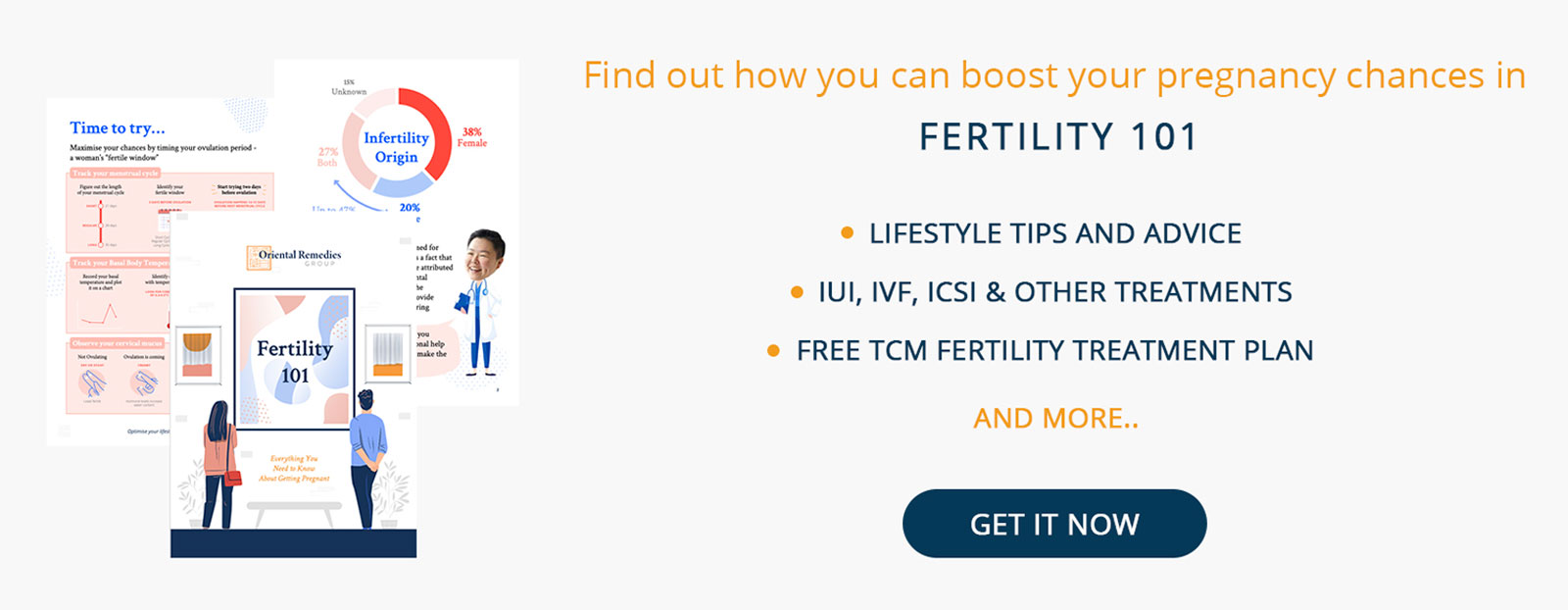Optimise your diet for better fertility
In general, a myriad of reasons can affect fertility, ranging from age to other reproductive issues. While many of these factors are out of our control, one key factor that we can control is our diet and lifestyle. In a study conducted in the United States of America (USA), participants who have followed a combination of five or more low-risk lifestyle factors, including diet, physical activity and weight management have shown to significantly reduce ovulatory disorder infertility [1]. While there is no specific food or fertility diet that can miraculously guarantee conception, eating a nutritious and well-balanced diet will definitely improve your overall well-being and in turn, boost your reproductive health.
In this article, we will list the top 30 foods that you can incorporate into your fertility diet.
Everyday food that can boost fertility for both male and female
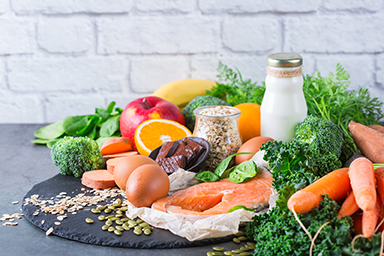
- Walnuts
Walnuts are a great source of alpha-linolenic acid, a type of Omega-3 polyunsaturated fatty acid (PUFA) in plants. For males, Omega-3 PUFAs are crucial for sperm maturation and membrane function, while for females, they have been shown to have a positive impact on fertility, potentially via improving oocyte quality and embryo implantation.
Walnuts are also rich in magnesium, which is necessary for the production of progesterone and maintaining a good blood supply to the womb, both of which helps prepare the womb for pregnancy.
How to eat: You can choose to take a handful of walnuts as a snack or add them to your salads, chicken, or oatmeal as a nutritional crunch.
- Eggs
Eggs, especially the egg yolks, are loaded with many essential nutrients such as iron, calcium, zinc, Vitamin B6, folate, Vitamin B12 and Vitamin A. Eggs from pasture-raised chickens are also packed with fertility-boosting Omega-3 fatty acids, eicosapentaenoic acid (EPA) and docosahexaenoic acid (DHA), which studies have shown to potentially prolong certain reproductive functions into advanced maternal age [2].
How to eat: You can choose to eat eggs in many different ways: hard-boiled, soft-boiled, scrambled, poached etc., but remember to eat the whole egg with the yolk included.
- Pomegranates
Rich in antioxidants, pomegranates have shown to be beneficial to both female and male fertility. For females, antioxidants can stimulate the uterus by improving blood flow to the womb as well as promote healthy uterine lining for implantation. As for males, antioxidants can improve sperm quality.
Pomegranates are also rich in important vitamins such as Vitamin C and E, and folic acid, all of which are beneficial when trying to conceive.
How to eat: You can eat the pomegranate seeds as a healthy snack, or even drink pomegranate juice. Ideally, take ½ to 1 cup of pomegranate juice occasionally. Take note that pomegranates may interact with certain medications, like blood thinners, so consult your doctor or physician first before incorporating it into your diet.
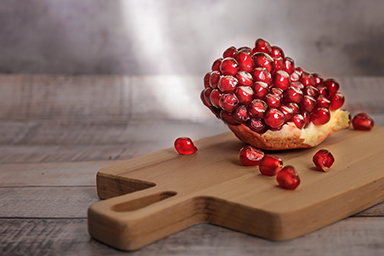
- Citrus fruits (Oranges, Grapefruits)
Citrus fruits are a great source of Vitamin C, which can help boost fertility and hormone levels in females, as well as improve males’ sperm count and quality.
Grapefruits and oranges also contain polyamine putrescine, which has been associated with the potential to improve egg and semen health.
How to eat: Enjoy orange slices on their own, or you can incorporate citrus fruit juices into your smoothies. Take caution that grapefruit juice can interact with certain medications, so speak to your doctor to check whether grapefruit juice is suitable for you.
- Pomelo
Pomelos are rich in Vitamin C, which not only helps boost the immune system but also helps in boosting fertility and hormone levels. Vitamin C also enhances sperm count, sperm motility and sperm quality, which in turn ensures higher chances of conception.
Pomelos are also packed with other fertility-boosting nutrients such as potassium, calcium and Vitamin B, which can help regulate ovulation and create a favourable environment for the ovulating eggs.
How to eat: You can simply enjoy pomelos as a fruit snack.
- Pineapple
Pineapples are a great source of Vitamin C. A 1 cup serving of pineapples will provide 46% of your daily recommended Vitamin C levels. Low Vitamin C levels have been associated with Polycystic Ovary Syndrome (PCOS), and so it is vital to reach your daily recommended intake of Vitamin C.
Pineapples also contain the natural enzyme bromelain, which has anti-inflammatory effects. Inflammation may impede fertility, and chronic inflammation can even encourage the body to suppress ovulation. Taking bromelain can encourage the immune system to deviate from an inflammatory state.
How to eat: Opt for fresh pineapples whenever possible, as most of the bromelain is destroyed in canned pineapples due to the heat in the canning process. You can choose to eat it fresh or even grilled. Take note not to over-consume pineapples, as they can lead to increased uterine contractions.
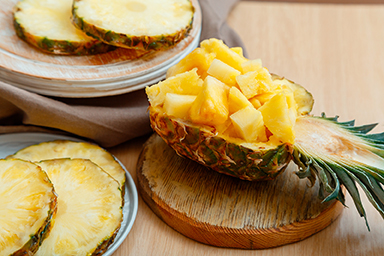
- Blueberries
Blueberries are not only high in Vitamin C and folic acid, both of which are essential fertility boosting nutrients, they are also packed with antioxidants. Antioxidants help in reducing damage to reproductive cells that are caused by environmental toxins and “free radicals”, thereby ensuring reproductive cells are healthy and functioning normally to boost fertility.
How to eat: You can just take a handful of blueberries to enjoy as a snack, or add them to your salads, smoothies, or yoghurt.
- Sunflower seeds
Roasted, unsalted sunflower seeds are packed with Vitamin E, which have been shown to help boost sperm count and motility. Sunflower seeds are also loaded with Omega-6 fatty acids and a small amount of Omega-3 fatty acids, which are known to impact fertility positively. Additionally, they are packed with other fertility-boosting nutrients such as zinc, folate and selenium.
How to eat: You can take sunflower seeds as a snack, or add them to your food for additional flavour and crunch.
- Mature cheeses
Mature cheeses, such as aged cheddar and parmesan are high in polyamines, which play an important role in our reproductive system. They are specifically high in polyamine putrescine, which may help improve sperm health and egg health, particularly in females aged 35 and older.
How to eat: Sprinkle some cheese on your food, or have a few pieces together with some nuts or fruits as a snack. Just be mindful of portion sizes since small amounts can pack a lot of calories and saturated fat, so enjoy them in moderation.
- Liver
Liver, especially cow’s liver, is loaded with fat-soluble vitamins such as Vitamin A, which is necessary for ensuring good quality of eggs as well as improving chances of implantation. They are also packed with highly absorbable iron and Vitamin B12, which helps in the prevention of miscarriages and anaemia. Liver also contains choline, Omega-3 fatty acids, and folate, all of which are great fertility-boosting nutrients.
How to eat: You can choose to make a simple liver and onions dish, or add liver into other meat-based dishes, such as meatloaf or meatballs.
- Beans and lentils
Beans and lentils are great sources of fibre and folate, which are both crucial in maintaining healthy hormonal balances. They are also packed with protein, which can promote healthier ovulation in females. Lentils also contain high levels of polyamine spermidine, which may aid in the fertilisation of the egg.
How to eat: You can consider replacing some meats with bean or lentil-based options. Alternatively, you can simply add beans to your salads. When choosing the canned variety, ensure that the cans are Bisphenol A (BPA)-free, as BPA can negatively affect estrogen levels in females.
- Asparagus
Asparagus, a superfood packed with nutrients, are not only low in calories and are filling, they also give you a boost of fertility nutrients. In a 1 cup serving, you will obtain your daily value of Vitamin K and 60% of your daily value of folic acid, both of which are crucial for females who are trying to conceive. In addition, asparagus contains glutathione, an antioxidant that helps improve female egg’s quality.
How to eat: Fresh or frozen asparagus would be most ideal. You can enjoy them as a vegetable side or add them to stir-fry dishes. Canned asparagus often contain lots of added sodium, so try to search for low sodium options whenever possible and rinse under running water before use.
- Tomatoes
Tomatoes are rich in lycopene, which is a powerful antioxidant that has been extensively studied for its potential in improving male fertility. A study has shown that supplementing 4-8 mg of lycopene per day for 8-12 months helped improve semen health and increase pregnancy rates [3]. It is best to opt for cooked tomatoes as 1 cup of cooked tomatoes contains almost twice as much lycopene as 1 cup of the raw variant.
How to eat: You can choose any cooked tomato recipe, from tomato-based soups to stews, or even simply roasted tomatoes.
- Oysters
Oysters are rich in selenium, an antioxidant that can help improve male potency as well as increase sperm motility, thereby increasing the chances of conception. Oysters are also packed with zinc, which is an important substance that affects sperm production and health. A large amount of zinc can improve sperm quality and motility, increasing sperm survival and in turn, increasing the chances of conception. Zinc can also help promote proper cell division, thereby ensuring a healthy conception.
How to eat: The healthiest option to enjoy oysters is raw, but you may also enjoy them baked.
- Salmon
Salmon are rich in essential fatty acids and Omega-3 fatty acids, which have been shown to be beneficial to fertility in males and females. They are also a great source of selenium, which is essential for the production of healthy sperms. In addition, salmon is a great source to obtain your daily recommended Vitamin D value, and low Vitamin D levels have been associated with poor fertility in both males and females. With just 3 ounces of smoked salmon, you can reach 97% of your daily recommended intake of Vitamin D.
How to eat: Be careful about mercury levels in fish while trying to conceive as well as during pregnancy, so try to limit salmon intake to 1-2 times per week. It is preferable to choose wild-caught salmon instead of farm-raised options whenever possible to avoid mercury contamination, antibiotics, and toxic food dyes.
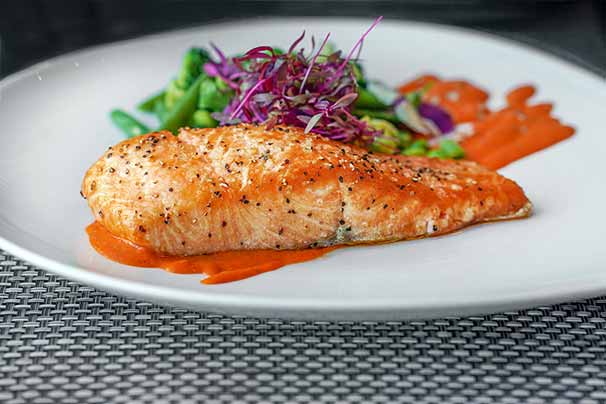
- Radish
Radish is packed with Vitamin C and folic acid. Vitamin C is great to boost fertility and hormone levels. Folic acid is necessary for the cell division process, which can help in ensuring healthy foetal development.
How to eat: You can add them into stir-fry recipes or soups, or eat them after boiling, steaming, or frying. Avoid eating them raw if you show signs of coldness i.e. cold hands and feet, poor blood circulation.
- Spinach
Spinach is a great source of iron and folate. Iron is extremely important for the menstrual cycle as it helps support ovulation and healthy egg development. It is also important to consume more iron before conception to ensure that you are not entering the pregnancy anaemic.
Folate is another fertility-boosting nutrient that helps support normal foetal development and also avoids pregnancy complications.
How to eat: You can choose to eat spinach raw in salads, or sauteed with some garlic.
- Sweet potato
Sweet potato is rich in beta-carotene, which is transformed into Vitamin A in the liver. Vitamin A is necessary for maintaining luteinising hormone (LH) levels, a hormone necessary for ovulation. In addition, Vitamin A deficiency has also been associated with secondary infertility among females of childbearing age [4].
How to eat: Sweet potatoes can be enjoyed in a multitude of ways. You can simply cut them into slices and add them into an air fryer for a simple and quick snack.
- Cod liver oil
Cod liver oil is a great source of Omega-3 fatty acids, which can help in reducing inflammation, balancing hormones, and promote blood flow to the womb, all of which helps in boosting fertility. Cod liver oil is also loaded with Vitamins A and D, both of which are fat-soluble vitamins that are essential for fertility and conception.
How to eat: You can choose to take cod liver oil in capsule or liquid form daily. If you are Vitamin D deficient, you can use cod liver oil to replace fish oil.
TCM herbs that can help to boost fertility
- Red dates 红枣
Red dates are a great source of many nutrients, including Vitamin C. For females, Vitamin C can help boost fertility and improve hormone levels, while for males, Vitamin C may help by improving sperm count and quality.
In TCM, red dates are used to nourish the Qi and Blood, and it is beneficial for women who have Blood deficiency issues.
How to eat: Boil 5 pieces of red dates in 10 minutes, and then simmer for another 15 minutes. You can add 2 slices of fresh ginger while the drink is still hot, and let it cool to about room temperature before consumption. Take note not to consume too many red dates in a day as it can result in bloating.
- Goji berries 枸杞子
Oxidative stress is one of the major causes of male infertility, and it is caused by free radicals attacking and damaging cells. Goji berries are packed with antioxidants and can help protect the cells from oxidative stress. In addition, goji berries have other benefits for the reproductive system, such as increasing sperm count, improving sex drive, improving reproductive hormone function, thickening the uterine lining and aiding implantation.
In TCM, goji berries enter the Kidney and Liver channels, and both these channels play a crucial role in reproduction. Goji berries are also used to nourish the Blood, Yin and Yang, and essence, which are all necessary for healthy fertility.
How to eat: There are many ways to enjoy these wonderful berries. You can enjoy them as a snack alone, or add them to your medicinal teas, soups, and even your porridge or cereals. You can even use them as an alternative for blueberries in baking, just simmer them in water for 5-10 minutes to plump them up before use.
- Maca 玛卡
Maca has been used for thousands of years to enhance fertility and sex drive. In two separate studies, maca has been shown to not only increase sexual desire in men [5], but also improve sperm production and motility [6].
How to eat: Maca supplements can be found in many different forms, just remember that the general dose for fertility is between 1000 to 3000 mg per day. Maca tends to be quite stimulating and provides an energy boost, so it is best taken before 3 pm. If you have any thyroid conditions, seek medical advice to see if you are suitable to take maca supplements.
- Cinnamon 肉桂
Cinnamon supplements can help regulate menstrual cycles in women with PCOS, which is a common cause of infertility in females. In a preliminary study conducted, it was reported that women with PCOS had an increased number of menstrual cycles while taking daily cinnamon supplements compared to those given a placebo [7], and as we know, the more ovulatory regular cycles, the more opportunities for conception.
In TCM, cinnamon is mainly used to warm the interior and nourish Yang energy, which needs to be abundant for fertility, particularly for males. In a study, cinnamon has been shown to have a beneficial effect on spermatogenesis and sperm quality parameters [9].
How to eat: You can sprinkle some cinnamon powder on your oatmeal, yoghurt, tea, or coffee. It can also be taken in supplement form, but always consult your doctor before starting a new supplement. Cinnamon is warming in nature, so avoid taking too much when you are feeling heaty (e.g., having an ulcer).
- Dried tangerine peels 陈皮
Dried tangerine peels can help support male sexual issues, which include impotence, low sperm count and premature ejaculation. In TCM, dried tangerine peels also have the function of regulating Qi in the body. This regulation of Qi helps in the regulation of blood pressure in females, where a stable blood pressure is necessary to ensure conception. The regulation of Qi, particularly in the digestive system, also helps in controlling symptoms like morning sickness in pregnant women.
How to eat: Boil 3-5 dried tangerine peels in water for 10 minutes, and simmer for 15 minutes. You may also choose to add dried tangerine peels to your soups or porridges.
- Chinese pearl barley 薏苡仁
In TCM, Chinese pearl barley is used against the dampness syndrome of infertility, where it can clear excessive fluids in the womb, fallopian tubes, and ovaries. Hence, it can be often found in TCM prescriptions that reduce cysts and other forms of fluid accumulation in the female reproductive system. For females struggling with PCOS where dampness imbalances are largely involved, the use of Chinese pearl barley is great due to its fluid-balancing properties.
How to eat: To make Chinese pearl barley water, add 100g of rinsed Chinese pearl barley to 1.5L of water to a pot and bring to a boil, then reduce the heat to simmer for 45-60 minutes, stirring every so often. When the barley is slightly soft on the outside and slightly chewy on the outside, and the water turns slightly cloudy, the drink is ready. You may also add 2-3 pandan leaves and simmer for 5-10 minutes. Add some brown sugar or rock sugar to taste. Avoid taking Chinese pearl barley during pregnancy unless prescribed by a TCM practitioner.
- Vitex (Chaste tree berry) 蔓荆子
Vitex is one of the popular herbs used for the regulation of the menstrual cycle, which is likely due to its action on the pituitary gland in the brain. Vitex can increase luteinizing hormone (LH) levels and mildly inhibit follicle-stimulating hormone (FSH) levels, which triggers and regulates ovulation, as well as increase progesterone production in the luteal phase.
Vitex also reduces prolactin secretion, which may inhibit fertility when levels are elevated. The reduction of prolactin also improves hormone balance and ovarian function.
How to eat: It is recommended to take a 40mg daily intake of dried vitex fruit. However, making a tea with the dried herb might be too bitter, so you can choose to add some honey or brown sugar to taste, or just opt for capsule options.
- Tribulus Terrestris 白蒺藜
Tribulus Terrestris is a highly useful herb for fertility. It is beneficial for females with irregular ovulation, especially for those with PCOS, as it helps to normalise the menstrual cycle and create more predictable ovulation. Tribulus Terrestris is also helpful for males, as it can help improve sperm health and quality. One study has shown that the herb helped increase conception rates for couples that had high levels of anti-sperm antibodies, particularly when both partners consumed the herb [9]. Anti-sperm antibodies are the result of the body having an immune response to semen, and they trigger an immune response to kill off the sperms. By taking Tribulus Terrestris, the effects of the anti-sperm antibodies can be reduced, improving the chances of conception. In the same study mentioned above, it was shown that there were also improvements in males’ sperm parameters, including count, motility and volume after taking the herb.
How to eat: Tribulus Terrestris can be taken in supplement form. If you are looking to eat in herb form, it is preferable to seek advice from a TCM practitioner.
- Chinese angelica root 当归
In TCM, angelica root is commonly used for many gynaecological issues such as menstrual irregularities and pains, mostly due to its ability to nourish the Blood. Angelica root is largely used for Blood deficiency syndrome and spleen and Kidney deficiency syndrome as it has nourishing properties, but it can also be used for Blood stasis syndrome because it also promotes the movement of Blood.
How to eat: You can add 10g of Chinese angelica root after rinsing it to your herbal soups. You can also add the herb to a simple chicken soup recipe.
- Glossy privet fruit 女贞子
The glossy privet fruit is commonly used in TCM to boost Liver and Kidney vitality, both of which are largely responsible for one’s fertility. The Kidney stores reproductive essence, while the Liver is responsible for the movement of Qi in the body. When any of these organs are not functioning normally, it may result in infertility. The use of glossy privet fruit to boost the vitality of both organs is thus useful in ensuring the proper functioning of the two organs, thereby boosting fertility.
How to eat: Add 5g of the herb into 200ml of hot water and soak to make a tea for consumption.
- White peony root 白芍
White peony root is another herb that is widely used in the treatment of gynaecological conditions. White peony root can help in hormonal balance by positively influencing low progesterone, reducing elevated androgens such as testosterone, as well as modulating estrogen and prolactin.
In TCM, white peony root can be used in combination with other herbs to target different conditions. For example, white peony root together with Chinese angelica root is great in nourishing the Blood, and is suitable for people with Blood deficiency syndrome. White peony root used with licorice root is great for relaxing muscles, which is why this combination is largely used for those with dysmenorrhea.
How to eat: You can choose to add 10-20g of the herb (depending on the volume) to your herbal soups to help boost the nourishing effect.
It is important to note that while all the above foods are great to include in your fertility diet, it is best to practice moderation in your diet. In addition, TCM herbs are mostly prescribed as a balanced formula to target individual constitutions, so it is best to consult your TCM physician for a prescription and to make sure that your constitution is suitable for the consumption of the above herbs.
Understandably, the long list of fertility foods might make you confused about where to begin. Here are two simple fertility tea recipes you can add to your fertility diet to boost your reproductive health:
Womb-Warming Tea Recipe for Females
Ingredients:
- A handful of red dates
- 1 tablespoon of dried longan
- 1 tablespoon of dried rosebuds
- 3 pieces of ginger
- A handful of goji berries (optional)
- Brown sugar (to taste)
Steps:
- Add all the ingredients into a cup
- Pour 250ml of boiling water, and allow the ingredients to simmer for 5-10 minutes before consumption
- Add brown sugar to taste
Tonifying Kidney Tea Recipe for Males
Ingredients:
- 3 slices of American ginseng
- 6 slices of Morinda root
- A handful of Goji berries
Steps:
- Add all the ingredients into a teabag.
- Simmer the tea bag in hot water for at least 5 minutes, and enjoy the tea during the day.
Additional tips to boost fertility for both male and female
While a healthy diet is crucial in boosting your fertility, other lifestyle changes are also necessary to ensure higher chances of conception. Such lifestyle changes include:
-
Achieving a healthy weight
Achieving a healthy weight is extremely important in female fertility, as the amount of fat stored in the body can affect menstrual function. Having a balanced, nutritious diet as well as reducing the intake of high trans-fat foods can help in the maintenance of a healthy weight, and at the same time boost fertility.
-
Active exercise
Keeping active through exercise is also crucial in boosting fertility. Engaging in physical activity can contribute to maintaining a healthy weight, which as mentioned above, is vital in female fertility. A study conducted in the USA has also found that a minimum of 1-hour of exercise 3 times a week helped improve implantation and pregnancy rates for females undergoing intracytoplasmic sperm injection (ICSI) [10]. It is recommended to engage in moderate-level physical activity for 30 min at least 5 times a week.
-
Lifestyle changes
There are many lifestyle practices that are detrimental to reproductive health, such as alcohol consumption and smoking. Alcohol is a depressant that can not only decrease sexual desire and lead to erectile and ejaculation dysfunctions, it also negatively impacts sperm quality. As for smoking, it can lead to damages in the DNA of eggs and sperm. Therefore, quitting smoking and alcohol abstinence is advisable for couples trying to conceive.
High caffeine intake may also affect fertility as excessive caffeine has been linked to increased risks of miscarriage. It is advisable for females trying to get pregnant to reduce their caffeine intake.
-
Mental and emotional health
Stress and emotional issues can greatly affect our fertility. Try to relieve your stress by doing yoga, meditation, or engaging in other relaxation techniques (e.g., breathing exercises, listening to music). It is best to seek professional help if you are experiencing prolonged stress.
Your healing is the most important!
At Oriental Remedies Group, our physicians are trained in both Biomedical Science and TCM at Nanyang Technological University (Singapore) and China for a minimum of 5-8 years before being certified to practice in Singapore.
If you are suffering from fertility issues and is looking to support your fertility journey with TCM, call/WhatsApp us at +65 8087 0486 for a personalised consultation with our bilingual physicians.
—–
This article is written by Physician Kelly Leow.
Physician Leow is a TCM physician at Oriental Remedies Group, a patient-centred healthcare provider offering effective treatments grounded in TCM and enhanced with medical technology.

Disclaimer:
The content on this page is for information and educational purposes only. Such medical information may relate to disease, injury, drugs and other treatments, medical devices and/or health products. Medical information does not amount to advice, and if advice is needed an appropriate professional help should be sought. The disclaimer asserts that no warranties or representations are given in respect of the medical information, and that the website operator should not be held liable if a user suffers any injury or loss after relying upon the medical information.
References:
[1] Chavarro, Jorge E. MD, ScD1,2; Rich-Edwards, Janet W. MPH, ScD2,3,4; Rosner, Bernard A. PhD2,5; Willett, Walter C. MD, DrPH1,2,4 Diet and Lifestyle in the Prevention of Ovulatory Disorder Infertility, Obstetrics & Gynecology: November 2007 – Volume 110 – Issue 5 – p 1050-1058
doi: 10.1097/01.AOG.0000287293.25465.e1
[2] Hammiche F, Vujkovic M, Wijburg W, de Vries JH, Macklon NS, Laven JS, Steegers-Theunissen RP. Increased preconception omega-3 polyunsaturated fatty acid intake improves embryo morphology. Fertil Steril. 2011 Apr;95(5):1820-3. doi: 10.1016/j.fertnstert.2010.11.021. Epub 2010 Dec 3. PMID: 21130435.
[3] Durairajanayagam D, Agarwal A, Ong C, Prashast P. Lycopene and male infertility. Asian J Androl 2014;16:420-5
[4] Kalampokas T, Shetty A and Maheswari A (2014) Vitamin A Deficiency and Female Fertility Problems: A Case Report and Mini Review of the Literature. J Women’s Health Care 3: 317. doi:10.4172/2167-0420.1000210
[5] Gonzales GF, Córdova A, Vega K, Chung A, Villena A, Góñez C, Castillo S. Effect of Lepidium meyenii (MACA) on sexual desire and its absent relationship with serum testosterone levels in adult healthy men. Andrologia. 2002 Dec;34(6):367-72. doi: 10.1046/j.1439-0272.2002.00519.x. PMID: 12472620.
[6] Gonzales GF, Cordova A, Gonzales C, Chung A, Vega K, Villena A. Lepidium meyenii (Maca) improved semen parameters in adult men. Asian J Androl. 2001 Dec;3(4):301-3. PMID: 11753476.
[7] Kort DH, Lobo RA. Preliminary evidence that cinnamon improves menstrual cyclicity in women with polycystic ovary syndrome: a randomized controlled trial. Am J Obstet Gynecol. 2014 Nov;211(5):487.e1-6. doi: 10.1016/j.ajog.2014.05.009. Epub 2014 May 9. PMID: 24813595.
[8] Khaki A. (2015). Effect of Cinnamomum zeylanicumon on Spermatogenesis. Iranian Red Crescent medical journal, 17(2), e18668. https://doi.org/10.5812/ircmj.18668
[9] Nikolova, V. & Stanislavov, R. Tribulus terrestris and Human Reproduction Clinical Laboratory Data Comptes Rendus de l’Academie Bulgare des Sciencesi, vol. 53, p.12:113
[10] Rao, M., Zeng, Z., & Tang, L. (2018). Maternal physical activity before IVF/ICSI cycles improves clinical pregnancy rate and live birth rate: a systematic review and meta-analysis. Reproductive biology and endocrinology : RB&E, 16(1), 11. https://doi.org/10.1186/s12958-018-0328-z
Note: all words in Italics mentioned henceforth refer to the TCM organ system and not the anatomical organs/terms referenced in western medicine.


